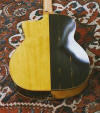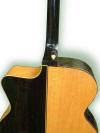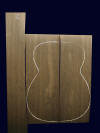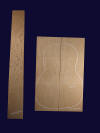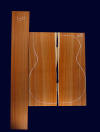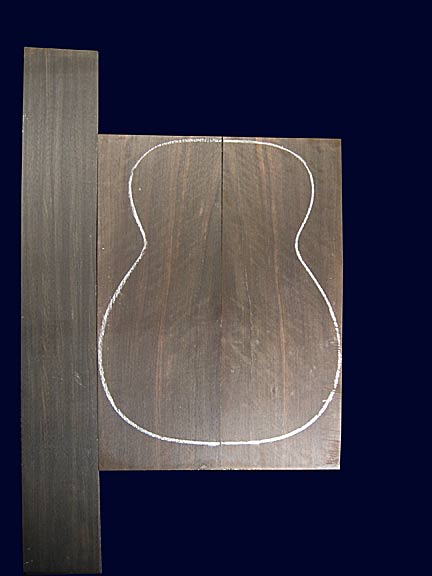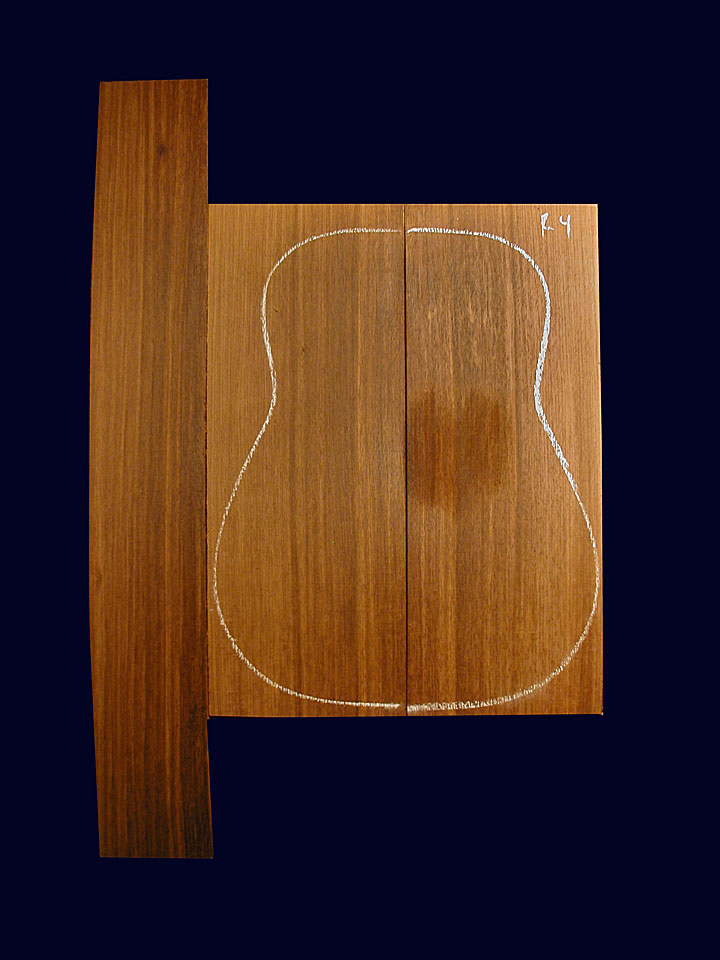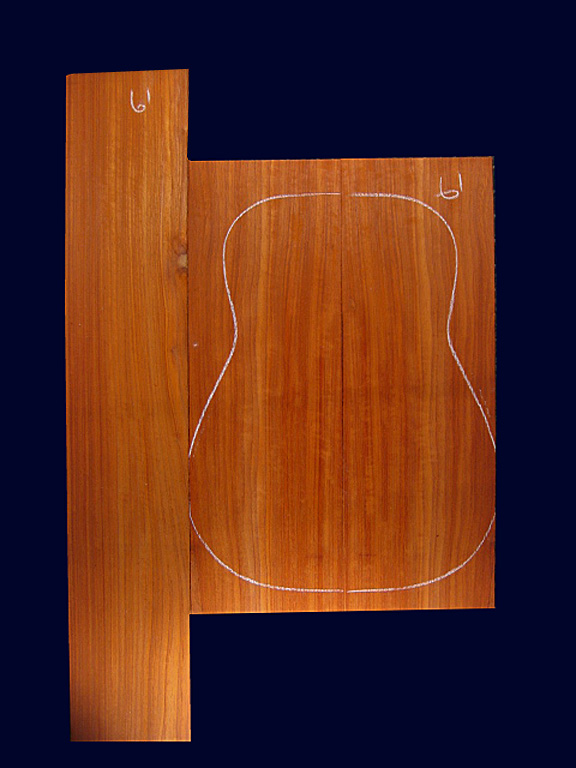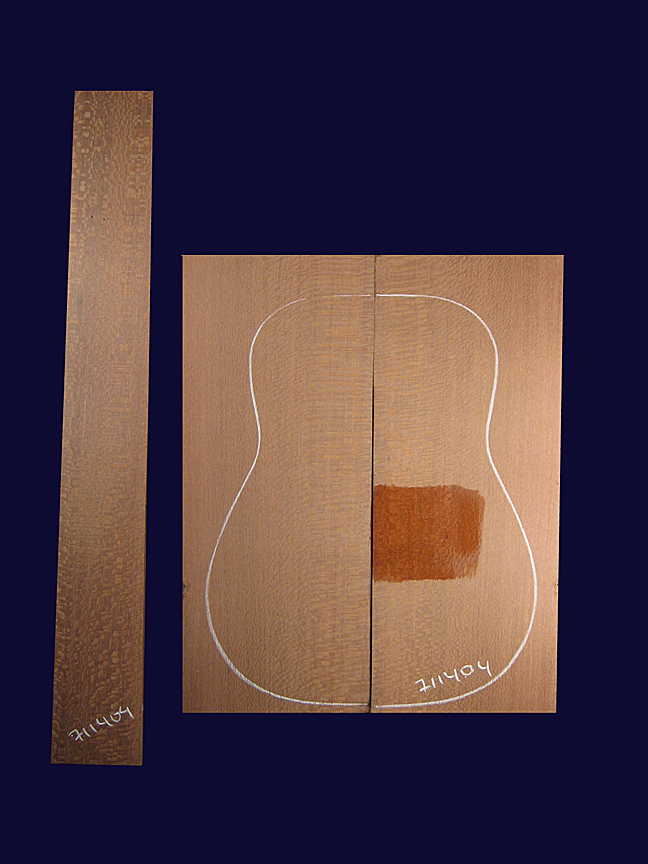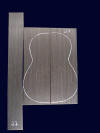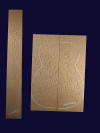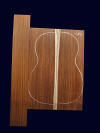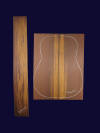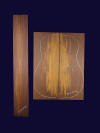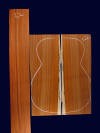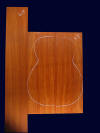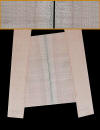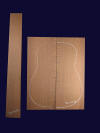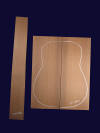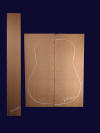UNUSUAL BACK & SIDE SETS
HOME ORDER ONLINE PRODUCTS REGISTER WHAT'S NEW?
Click on Part ID to add to shopping cart More info below
Part No. Description Each 6 - 12 Black Ebony, back, steel/classic Black Ebony, sides, steel/classic Panama rosewood, back, steel Temp. out
Panama rosewood, sides, steel Temp. out
Panama rosewood, back, classic Temp. out
Panama rosewood, sides, classic Temp. out
Padauk, back, steel/classic Temp. out
Padauk, sides, steel/classic Temp. out
Lacewood (Silver Oak), back, steel/cl, standard Temp. out
Lacewood (Silver Oak), sides, steel/cl, standard Temp. out
Brazilian lacewood back, steel/cl, standard Temp. out
Brazilian lacewood sides, steel/cl, standard Temp. out
Brazilian leopardwood back, steel/cl, standard Temp. out
Brazilian leopardwood sides, steel/cl, standard Temp. out

Above and below "Harlequin" guitars by Canadian luthier Michael Dunn. Half ebony, half satinwood (See our Silver Oak, below.)Photo courtesy of Michael.
BLACK EBONY (Diospyros ebenum)
Black ebony makes a striking guitar! About 15 years ago it was popular among the classic makers of Spain, when it was easier to get, and the price was not so dear. This is Indian ebony, not so brittle as the African ebonies, and it bends quite well.
BRAZILIAN LACEWOOD (Roupala brasilensis)
There are a variety of "lacewoods" out there, but this is the real McCoy. Fairly hard, medium weight (about like Indian rosewood), nice tap tone, etc. Although rumored to be a little difficult to bend, we've sold many sets, with no reports of problems, and we've sold no sides alone, which is a good indication. The "blotch" on the right panel is a little naptha to show what it looks like under finish. We're now offering it for electric guitar top plates, too.
PANAMA ROSEWOOD (Dalbergia sp.) The blotch on the above back is a little residual naptha to see what the the wood looks like under finish.
This rosewood from Panama is not listed by the U.S. Forest Products Lab. Bark, leaves, and seeds were sent to the Madison lab, and all they could ascertain was that it was indeed a Dalbergia. It is in appearance very similar to Honduran rosewood, straight and fine grained, but it is lighter in weight, and tends toward brown in color. Most luthiers who have tested this wood say it compares well to Brazilian rosewood, and we believe that it's an excellent replacement wood for the vintage Brazilian look. This has so many strong possibilities that we've sold a good number of sets to several factories. It's one of the few true rosewoods apart from Indian rosewood that can still be had at a reasonable price. In some of the more recent shipments the sets display a great variation in appearance, with most having what appear to be drying checks in the panels. Click on some of the thumbnails for an idea of what we're describing. (It is only appearance, no splits, checks, voids.) Update: we've concluded that it is Dalbergia tucerencis.
AFRICAN PADAUK (Pterocarpus soyauxii) African padauk is almost redundant since the other padauk from the Andaman Islands, off the coast of Indian, hasn't been exported for a number of years. (We used to offer the Andaman version about 20 years ago at the old Luthiers Mercantile.)
The African version while initially bright orange when freshly cut, oxidizes to a more subtle orange brown in time. The stock we have at present is 12 years air-dried. One of our local customers claims that it makes "killer" sounding guitars when paired with a cedar top.
SILVER OAK (Grevillea robusta)
Variously known as Silver oak, Silk oak, and Lacewood, this beautiful wood is a native of Australia, but is now found throughout tropical and subtropical climates. Similar in density to Bigleaf maple, but easier to work, we've heard good things about this as a guitar wood. While we've sold several hundred sets of this wood, we've yet to see a guitar of it. It is virtually identical to Sycamore in many characteristics, and that is a wood that we know has been used in guitars. See the above right thumbnail of a Santa Cruz guitar of California sycamore made for Paul Hostetter. It got rave reviews at a recent NAMM show. (Click on it to enlarge.)
LEOPARDWOOD (Panopsis rebellens)
Leopardwood (Panopsis rebellens) is occasionally confused with some of the lacewoods. But it's much harder and heavier (a little heavier than Indian rosewood in weight), and darker. It finishes nicely, but there's a rumor that it's a little tricky to bend (don't know anyone that's built with it). Rich, lots of depth...beautiful! Several orders and good comments at the recent NAMM show: "surprisingly heavy," "hard," and "good tap tone!"

Michael Greenfield picked up one of these sets, destined for a guitar for Keith Richards.
Click on thumbnails to enlarge.
Address General Information Sales/support Telephone:
707-431-3760 POB 217, 101 C Grant Avenue, Healdsburg, Ca. 95448 USA info@alliedlutherie.com sales@alliedlutherie.com Fax:
707-431-3762 Price List
Download in PDF Format, 4 pages tabloid size.
